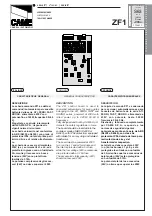
GE Multilin
B30 Bus Differential System
7-9
7 COMMANDS AND TARGETS
7.2 TARGETS
7
Target: self reset
Message: SFP MODULE x FAIL
The webpage "SFP Transceiver Information" described in the previous section applies for this self test as well. The "SFP
Module Fail" has higher priority and it suppresses the "Ethernet Fail" target message. The "SFP MODULE FAIL FUNC-
TION" setting enables/disables this self test. The target for this self test is priority-based, with the third one being the high-
est priority. For example, if all three SFP modules fail, then the third SFP target is activated. If the third SFP module failure
resolves, then the second SFP target is activated.
HARDFIBER SELF-TEST ERROR MESSAGES
In addition to those provided by the standard UR-series devices, the UR devices implement HardFiber self-tests. These are
listed below. Any abnormal diagnostic condition indicated by the LEDs or the critical failure relay also results in a self-test
message, so troubleshooting is described here. For other relays, such at the B95
Plus
, see that product’s instruction manual.
Equipment Mismatch Major Self-Test
Description: The number or type of installed hardware modules does not match the order code stored in the CPU. The stan-
dard UR-series Equipment Mismatch self-test is extended to cover the possible presence of a Process Card.
Severity: Protection is not available and all contact outputs and shared outputs are de-asserted.
If this message appears, check all modules against the order code. Ensure they are inserted properly, and cycle the control
power. If a module has intentionally been added or removed use the
Update Order Code
command to notify the relay that
the current module configuration is correct.
Module Failure Major Self-Test
Description: UR-series device module hardware failure detected.
Severity: Protection is not available and all contact outputs and shared outputs are de-asserted.
If this message appears, contact the factory and supply the failure code noted in the display. Text in the message identifies
the failed module (for example, H81). If operated on a Process Card failure, the Module Fail self-test seals-in (latches) till
the UR-series device is restarted.
Process Bus Failure Major Self-test
Description: Mission critical data is not available via the process bus. An AC quantity is considered critical if both AC bank
origins and the crosschecking settings are other than none. This self-test is also initiated by an AC input discrepancy being
detected. See the description of the crosschecking setting in this manual for further information. In addition, this self-test
can be initiated by user logic responding to loss of critical contact input/output or other data using the
Process Bus Failure
Operand
user-programmable self-test setting. This setting is located in the
Settings > Product Setup > User-Program-
mable Self Test
menu.
Severity: Protection is not available and all contact outputs and shared outputs are de-asserted.
If this message appears, first rectify any Process Bus Trouble and Brick Trouble self-test errors. Check the actual value of
the operand referenced by the
Process Bus Failure Operand
setting, and if “On”, determine the cause and rectify.
Should the problem persist with the foregoing all clear, the cause must be an AC input discrepancy, which is typically the
result of problems in the input signals to the Bricks, or faults in the Brick input conditioning hardware. If the error was
annunciated the first time significant signal was encountered, suspect the former cause and check the copper connections
external to the Brick. Where multiple UR-series devices have self-test errors, look for common causes.
To further isolate AC input discrepancy errors, put the relay in test-isolated mode, then one by one, temporally change an
AC bank crosschecking setting to none, until the Process Bus Failure clears. Once the problem AC bank has been identi-
fied, the values from each of the two Bricks can be examined individually by temporarily mapping each to an AC bank with
a single origin.
Process Bus Trouble Minor Self-Test
Description: Communications problems with one or more Bricks. The text of the message identifies the affected field units.
This self-test is initiated by low received signal levels at either the Brick or Process Card end, and by the sustained failure
to receive poll responses from the proper Brick.
Severity: This self-test error does not directly inhibit protection. However, the affected Brick inputs/outputs may not be avail-
able to the UR-series device.
Содержание B30 UR Series
Страница 10: ...x B30 Bus Differential System GE Multilin TABLE OF CONTENTS ...
Страница 92: ...3 44 B30 Bus Differential System GE Multilin 3 3 DIRECT INPUT AND OUTPUT COMMUNICATIONS 3 HARDWARE ...
Страница 122: ...4 30 B30 Bus Differential System GE Multilin 4 3 FACEPLATE INTERFACE 4 HUMAN INTERFACES 4 ...
Страница 326: ...5 204 B30 Bus Differential System GE Multilin 5 10 TESTING 5 SETTINGS 5 ...
Страница 412: ...A 12 B30 Bus Differential System GE Multilin A 1 PARAMETER LISTS APPENDIX A A ...
Страница 554: ...D 10 B30 Bus Differential System GE Multilin D 1 IEC 60870 5 104 APPENDIX D D ...
Страница 566: ...E 12 B30 Bus Differential System GE Multilin E 2 DNP POINT LISTS APPENDIX E E ...
Страница 574: ...F 8 B30 Bus Differential System GE Multilin F 3 WARRANTY APPENDIX F F ...
















































